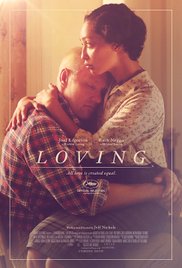 It’s been several weeks since I saw Loving. It was the final day of the Middleburg Film Festival and I felt inspired, almost humbled to watch the movie in Virginia, the state at the center of Loving, which is based on a true story. It never occurred to me that its wide release would coincide with the immediate aftermath of one of the most divisive Presidential elections in U.S. history. An election that would threaten the very foundation of the Supreme Court and potentially undermine precedents it has set to right the wrongs of history and protect a citizen’s right to marry whomever they want, regardless of race or sexual orientation.
It’s been several weeks since I saw Loving. It was the final day of the Middleburg Film Festival and I felt inspired, almost humbled to watch the movie in Virginia, the state at the center of Loving, which is based on a true story. It never occurred to me that its wide release would coincide with the immediate aftermath of one of the most divisive Presidential elections in U.S. history. An election that would threaten the very foundation of the Supreme Court and potentially undermine precedents it has set to right the wrongs of history and protect a citizen’s right to marry whomever they want, regardless of race or sexual orientation.
Loving is about a landmark Supreme Court case in which the Justices ruled, in 1967, that Virginia’s law banning interracial marriage was unconstitutional. 1967! The year I was born (i.e. not THAT long ago!). The film is not a traditional legal drama. It focuses instead on Richard and Mildred Loving (their actual last name) as a couple, and their efforts to live a normal, quiet and private life while the legal process played out over 10 years. It really is a fascinating and moving story that isn’t all that well known but certainly should be. It’s a bit odd that the film should star an Aussie (Joel Edgerton) and an Ethiopian-Irish actor (Ruth Negga) as native Virginians. But they pull it off rather well. I recently saw a photo of the real Loving couple in a corner of the new National Museum of African American History and Culture, and the resemblance to the actors was rather striking. Unfortunately, there isn’t much in terms of character development in Loving. The film shies away from the facts of how and when the couple got together (as teens). Instead, it picks up with their decision to marry, when Mildred was pregnant with their first child. They had to go to DC to legally tie the knot. But Virginia was their home, and they wanted to return there. When they did, they were arrested. Eventually, with the Civil Rights movement ramping up, Mildred wrote to Attorney General Robert Kennedy to ask for help. He referred their case to the ACLU, and the rest is well, history.
The movie isn’t great, but it’s solid, and relevant to modern times, particularly in light of the recent ruling legalizing gay marriage. As former Attorney General Eric Holder pointed out in a post-screening Q&A, the high court generally reflects our times. “The rulings are an indication of where we are as a nation.” Based on where we are as a nation today, I’m even more inclined to recommend that folks go see it. To remind us how far we’ve come as a nation, how far we still have to go, and how dangerous it would be to backslide. Hopefully, we’ll continue to move in the right, Loving direction.

